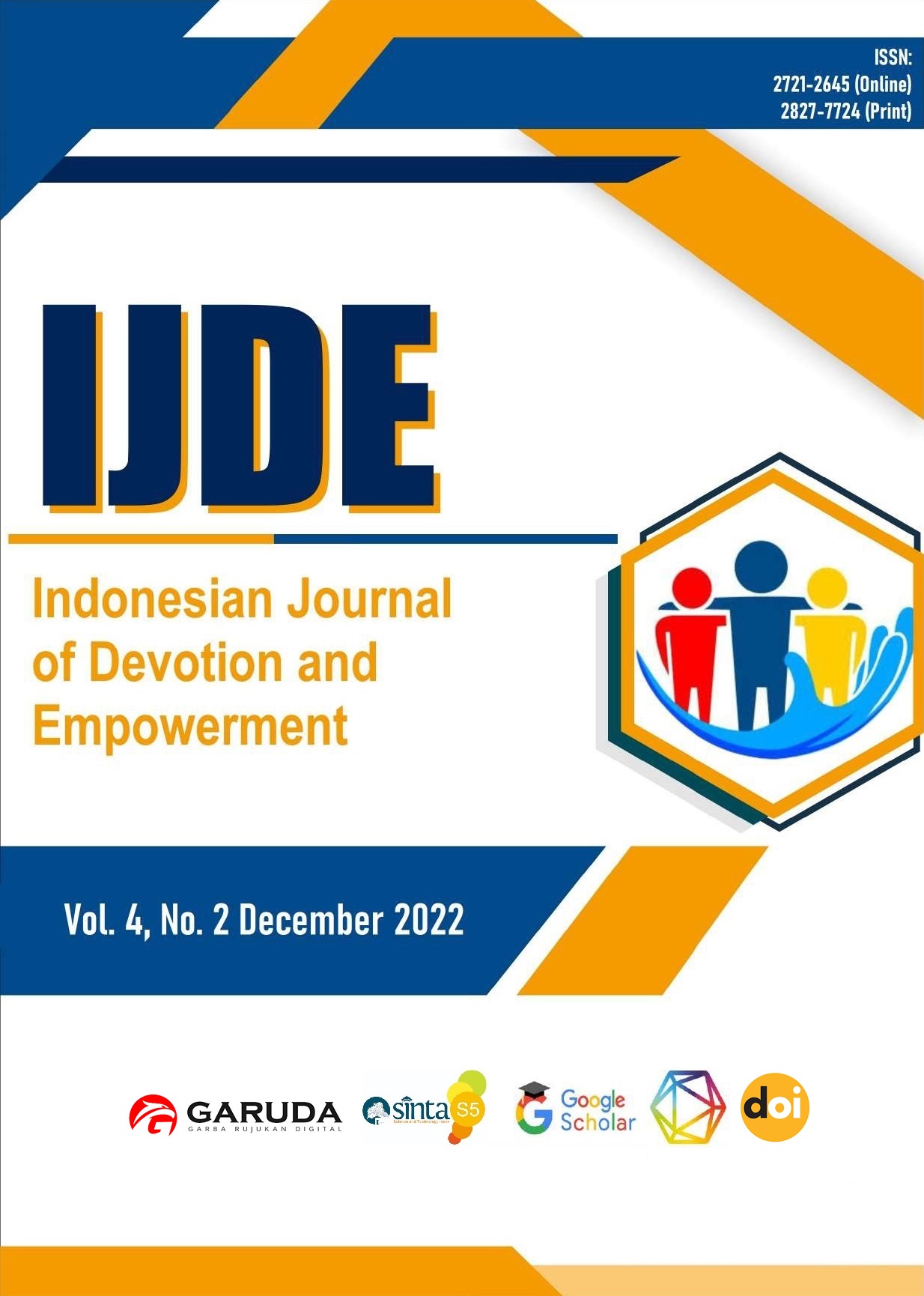Development of Tourism Village Through Community-Based Tourism (CBT) Concept Approach in Branjang Village Amir Mahmud, Nurdian Susilowati, Ida Nur Aeni, Eka Rahmawati Section Articles
##plugins.themes.academic_pro.article.main##
Abstract
This service activity aims to understand the development of tourist villages and awareness of village community participation. The service method used is socialization and training. The target audience for the service activities is the village government and POKDARWIS Branjang Village. Activities are packaged in the form of webinars and discussions using zoom meetings. The results show that the village government, POKDARWIS managers, and the community can understand the concept of developing a tourist village and its mapping for community welfare. Branjang Village has officially become a Tourism Village based on the decision of the Central Java Provincial Tourism Office. Community involvement in determining tourism potential and opportunities is the primary key to developing a tourist village. In addition, the Village's understanding of community-based tourism continues to be socialized through POKDARWIS, which is ready with its vision and mission to develop tourism in the Village. Funding and policy support continues to be carried out so that tourism in the Village can continue to exist and benefit the broader community.
Tujuan kegiatan pengabdian ini adalah pemahaman pengembangan desa wisata dan kesadaran partisipasi masyarakat desa. Metode pengabdian yang digunakan adalah sosialisasi dan pelatihan. Khalayak sasaran kegiatan pengabdian adalah pemerintah desa dan POKDARWIS Desa Branjang. Kegiatan dikemas dalam bentuk webinar dan diskusi menggunakan zoom meeting. Hasil menunjukkan bahwa pemerintah desa, pengelola POKDARWIS, serta masyarakat dapat memahami konsep pengembangan desa wisata dan pemetaanya untuk kesejahteraan masyarakat. Saat ini Desa Branjang telah resmi menjadi Desa Wisata berdasarkan keputusan Dinas Pariwisata Provinsi Jawa Tengah. Keterlibatan masyarakat dalam menentukan potensi wisata dan peluang wisata menjadi kunci utama keberhasilan pengembangan desa wisata. Disamping itu, pemahaman tentang pariwisata berbasis masyarakat terus disosialisasikan oleh Desa melalui POKDARWIS yang siap dengan visi misinya mengembangkan wisata yang ada di desa. Dukungan dana dan kebijakan terus dilakukan agar wisata yang ada di desa dapat terus eksis dan memberikan manfaat bagi masyarakat luas.
##plugins.themes.academic_pro.article.details##
References
Beath, A., Christia, F. and Enikolopov, R. (2013) ‘Empowering women through development aid: Evidence from a field experiment in Afghanistan’, American Political Science Review, 107(3), pp. 540–557. doi: 10.1017/S0003055413000270.
Đurkin, J. and Perić, M. (2017) ‘Organising for community-based tourism: Comparing attitudes of local residents and local tourism entrepreneurs in Ravna Gora, Croatia’, Local Economy, 32(7), pp. 678–691. doi: 10.1177/0269094217734811.
Eversole, R., Barraket, J. and Luke, B. (2014) ‘Social enterprises in rural community development’, Community Development Journal, 49(2), pp. 245–261. doi: 10.1093/cdj/bst030.
Farmaki, A. (2016) ‘Managing Rural Tourist Experiences: Lessons from Cyprus’, The Handbook of Managing and Marketing Tourism Experiences, pp. 281–298. doi: 10.1108/978-1-78635-290-320161011.
Farmaki, A. (2017) ‘Managing Rural Tourist Experiences: Lessons from Cyprus’, The Handbook of Managing and Marketing Tourism Experiences, pp. 281–298. doi: 10.1108/978-1-78635-290-320161011.
Lee, T. H. and Jan, F. H. (2019) ‘Can community-based tourism contribute to sustainable development? Evidence from residents’ perceptions of the sustainability’, Tourism Management. Elsevier, 70(September 2017), pp. 368–380. doi: 10.1016/j.tourman.2018.09.003.
Luke, B. and Chu, V. (2013) ‘Social enterprise versus social entrepreneurship: An examination of the “why” and “how” in pursuing social change’, International Small Business Journal, 31(7), pp. 764–784. doi: 10.1177/0266242612462598.
Nair, V. et al. (2015) ‘Benchmarking innovations and new practices in rural tourism development: How do we develop a more sustainable and responsible rural tourism in Asia?’, Worldwide Hospitality and Tourism Themes, 7(5), pp. 530–534. doi: 10.1108/WHATT-06-2015-0030.
Nair, V. and Hussain, K. (2013) ‘Conclusions: Contemporary responsible rural tourism innovations: What are the emerging contemporary rural tourism innovations and how are they enhancing responsible tourism practices in Malaysia?’, Worldwide Hospitality and Tourism Themes, 5(4), pp. 412–416. doi: 10.1108/WHATT-04-2013-0023.
Nurhidayati, S. E. (2015) ‘Studi evaluasi penerapan Community Based Tourism (CBT) sebagai pendukung agrowisata berkelanjutan’, Masyarakat, Kebudayaan dan Politik, 28(1), p. 1. doi: 10.20473/mkp.v28i12015.1-11.
Phillipson, J. et al. (2019) ‘Shining a spotlight on small rural businesses: How does their performance compare with urban?’, Journal of Rural Studies. Elsevier, 68(September 2018), pp. 230–239. doi: 10.1016/j.jrurstud.2018.09.017.
Ranjan, R. (2015) ‘Rural entrepreneurism and developmental outcomes under climate change threats’, Climate and Development. Taylor & Francis, 7(4), pp. 353–366. doi: 10.1080/17565529.2014.951016.
Steiner, A. and Atterton, J. (2015) ‘Exploring the contribution of rural enterprises to local resilience’, Journal of Rural Studies. Elsevier Ltd, 40, pp. 30–45. doi: 10.1016/j.jrurstud.2015.05.004.
Susilowati, N., Anisykurlillah, I. and Lianingsih, S. (2019) ‘Peningkatan Kapabilitas Pengurus Unit Usaha E-Warung BUMDes Sumber Arto Melalui Pemahaman Pembukuan Sederhana’, pp. 294–298.
Zakaria, F. and Suprihardjo, D. (2014) ‘Konsep Pengembangan Kawasan Desa Wisata di Desa Bandungan Kecamatan Pakong Kabupaten Pamekasan’, Teknik Pomits, 3(2), pp. C245–C249. doi: 2337-3520.
